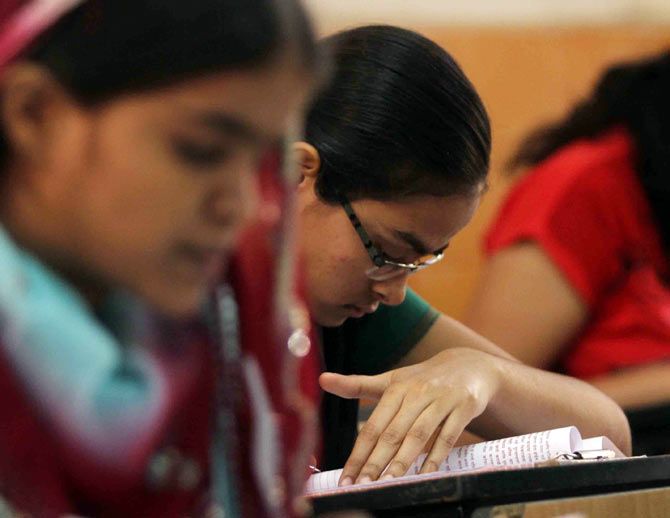With too much preparation leading to the board examination, it takes the punch out of the final board -- the students are both bored and burnt out by the time the actual board exams show up, says Anjali Bhargava.

The Class X and XII board examinations season is underway and I happened to meet a bunch of five boys -- all in Class X -- who are in the throes of it.
All five boys are a part of the ICSE system, so they still have the Class X board examinations to contend with as opposed to their friends and counterparts in the CBSE system, which has done away with them.
The boys had just finished their final (school, in house) examinations and begun their pre-board examinations that would continue for almost a month, followed by their final board examinations, which would begin in February and end in March -- lasting almost a month.
They all said it was like being on a treadmill that never stops.
One examination merges into the next and they have little respite for what amounts to a total of five months.
Since this was the predominant issue on their minds, I chatted with them for a while about it and asked them a few things: whether they wanted ICSE to do away with the board exam like its counterpart CBSE had done; whether exam after exam left them better prepared by the end of it and how they dealt with the pressure.
Their answers came as quite a surprise to me.
All five boys were happy they had the tenth board external examinations to deal with before they were required to take the Class XII board on which their career and future hinges.
Their point was that they would rather take their first external examination before the Class XII since so much hinged on it.
They didn't envy their CBSE counterparts at all.
At least they had the practice of taking one set of external tests before the big Class XII exam was upon their heads.
Their point: if the system has to be reformed, less must depend on the Class XII outcome. So, for the Class X boards to go, Class XII has to be less significant.
The reform has to be all or nothing. If the system could be reformed to make the Class XII results less important by devising an assessment system that was more holistic, then doing away with the Class X examinations makes sense. Else, it is a bit like delaying the inevitable.
Second, the boys were of the view that by having a continuous five months of exams, it takes the punch out of the final board -- they are both bored and burnt out by the time the actual board exams show up.
If one included the half-yearly exams (held in September), it was a total of seven months of endless examinations and pressure.
Contrary to what their school, teachers and parents generally thought, this continuous testing was not necessarily leaving them better prepared; in fact it left them cold and a bit indifferent to the final outcome. In their view, it made sense to have one serious set of tests followed by the board exams after a significant gap for it to retain its sanctity and seriousness.
A third point they all unanimously made was that the vastness of their syllabus was intimidating and a lot of what it required them to memorise and reproduce seemed pointless to them. They all had a total of 10 subjects.
In all five cases, the boys were quite clear which stream they were heading into (humanities, commerce or science) and they essentially had to get over with the rest of the subjects -- the ones they had no intention to pursue.
Their argument was the system was basically flawed since it required them to put a mammoth effort into subjects they were looking to drop a few months down the line.
Choices -- which in the Indian system are made only in Class XI -- in their view should be allowed earlier since today's kids (unlike in our time) could make up their minds earlier.
And, lastly, all five boys were clear that they were more dependent on their tutors and out-of-school coaching than the school itself.
Relying on the school alone was simply not an option.
Almost all the boys were taking extra tuitions for three to four subjects (maths was common to all).
Ironically, last year when their school's results were exceptionally good, many parents sent out an e-mail or online message congratulating the school's tutors (and not teachers) for their effort.
Although the boys found it funny, it is to my mind actually a sad commentary on the state of Indian education.
Lead image used for representational purposes only. Image: Sahil Salvi










